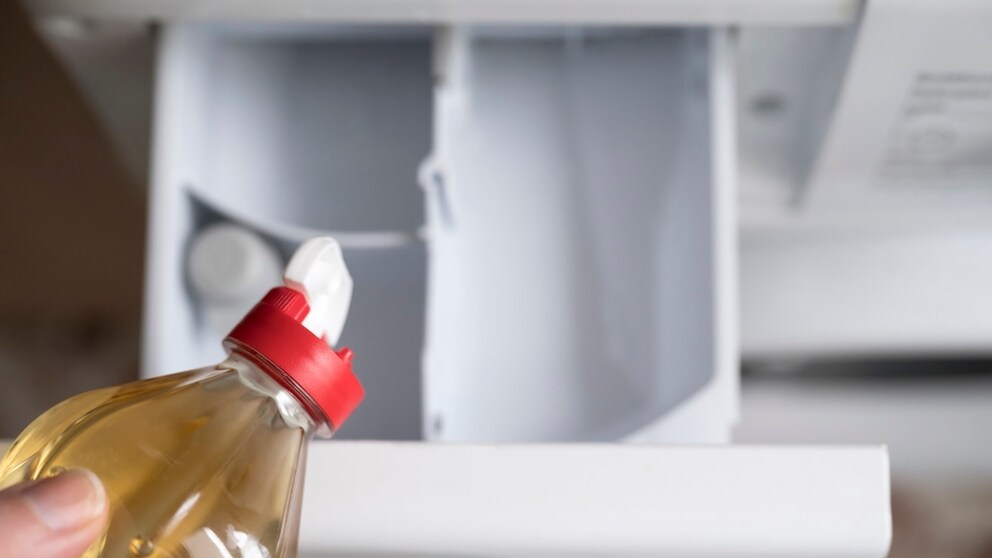April 23, 2025, 12:37 pm | Read time: 3 minutes
Vinegar is considered a true miracle worker in the household. The acid it contains is effective for removing lime deposits in coffee makers, kettles, or the aerators of faucets. Some people also use vinegar to descale washing machines or as a fabric softener substitute. This myHOMEBOOK article explores why that might not be a good idea in the long run.
While some household guides tout vinegar as a descaler for the washing machine, manufacturers of these appliances generally advise against it. What works for smaller kitchen utensils can lead to significant damage in washing machines. myHOMEBOOK spoke with Dr. Bernd Glassl from the German Cosmetic, Toiletry, Perfumery and Detergent Association (IKW) about this issue.
Vinegar in the Washing Machine Is Bad for Rubber and Metal
“Vinegar is bad for rubber seals and hoses, as well as metallic parts inside the washing machine,” explains Glassl. The age of the appliance doesn’t matter. Even newer models can’t tolerate acetic acid over the long term.
“Chemically speaking, it is a volatile substance, meaning the acid evaporates more easily than the washing solution present in the machine,” the IKW expert explains. He adds, “Due to its volatility, acetic acid reaches parts inside the washing machine that the washing solution cannot.” This causes metallic parts to rust over time.
Vinegar—a Question of Dosage?
Could a lower vinegar dosage help avoid damage? In fact, a lower acid concentration does have an effect. However, it’s only a matter of time before water leaks from the machine. Regular contact of the seals with acetic acid reduces the strength of the rubber.
It also makes a difference whether someone pours vinegar essence, which is concentrated vinegar, or pure vinegar into the washing machine. The essence contains about 25 percent acetic acid. Pure vinegar typically has an acid content of only ten percent.
“The degree of damage depends on whether, for example, 100 milliliters of vinegar essence are added with every wash cycle or ten milliliters of household vinegar with every tenth load,” explains Bernd Glassl from IKW regarding the effects of using vinegar.
Despite the calculation example, the expert advises against using vinegar as an alternative descaler for the washing machine. Damage is damage. When it occurs, it’s usually at the most inconvenient time.
Vinegar Also Unsuitable as a Fabric Softener
Vinegar is not really suitable as a fabric softener substitute either. For textiles, acetic acid only removes existing lime deposits from the fabric fibers. Jeans or sweaters feel just as stiff after drying as they do without the addition of vinegar. Moreover, the acid reduces the strength of synthetic fibers in the laundry. Over time, acetic acid causes shirts to fray and seals or hoses to crumble.
By the way, with the correct dosage of detergent, the machine doesn’t need to be descaled at all or only very rarely. Most commercial products already contain water softeners.

Musty-Smelling Bed Linen in the Wardrobe? What You Can Do

How Does a Washing Machine’s Eco Program Actually Work?

Why the washing machine’s quick wash program does not save money
Determine Water Hardness
In case of doubt, a call to the local water authority is enough to inquire about the water hardness level. “In areas with hard water, more detergent is needed than in areas with medium-hard or soft water,” says Bernd Glassl from IKW. The exact hardness level dosage is indicated on the detergent packaging.
In a few regions in Germany with particularly hard water—such as around Würzburg and parts of Saxony-Anhalt—Glassl recommends using one of the commercially available additional products to descale the washing machine.

